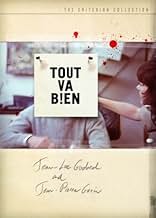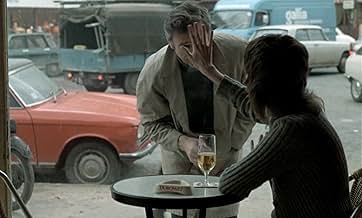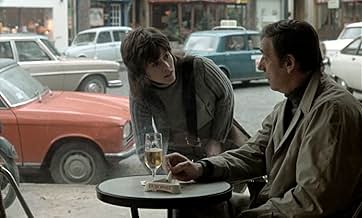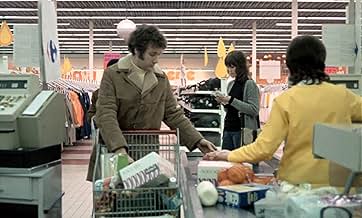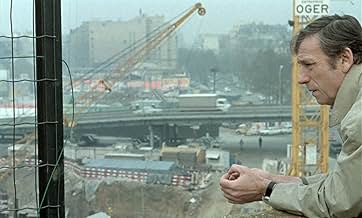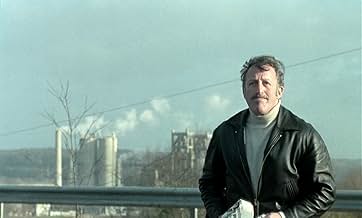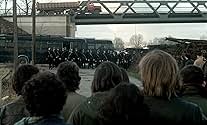IMDb RATING
6.5/10
4.1K
YOUR RATING
Godard examines the structure of movies, relationships and revolutions through the life of a couple in Paris.Godard examines the structure of movies, relationships and revolutions through the life of a couple in Paris.Godard examines the structure of movies, relationships and revolutions through the life of a couple in Paris.
- Directors
- Writers
- Stars
- Awards
- 1 win total
Louis Bugette
- Georges
- (as Bugette)
Yves Gabrielli
- Léon
- (as Yves Gabrieli)
- Directors
- Writers
- All cast & crew
- Production, box office & more at IMDbPro
6.54K
1
2
3
4
5
6
7
8
9
10
Featured reviews
One of Godard's finest efforts.
I find that the films of Jean-Luc Godard rarely speak to me, but they do, such as Pierrot Le Fou, it really hits hard. Perhaps he's most effective when he talks about cinema itself. While Pierrot is most profoundly interesting through its debate about the arts, Tout Va Bien immediately addresses its own existence in its opening scene. It analyzes premise, storytelling, filmmaking and how they got the film made with how it cast two major stars in the lead roles. It's fascinatingly direct, almost confessional. With this abrasive and confrontational style in mind it charges full throttle into its politics of the French revolution in the late 60s as the lower and middle classes rebel against capitalism. While sometimes it can be a little too on-the-nose with its arguments as characters talk to the audience, Godard's point is undeniable and its very well demonstrated through the style. The highlight of the film is definitely the use of sets and colour. I love the stage-like sets where you can see into two floors and a dozen rooms. It categorizes the drama in a cartoonish way that satirizes the politics brilliantly while still retaining their power. Although this argument does interrupt the initial contrived story, it jumps back into it seamlessly making it work for the characters in an unexpectedly emotional way. Tout Va Bien is an incredible film and one of Godard's finest efforts. It lived up to my expectations and more.
9/10
9/10
Newly released on (Region 1) DVD by Criterion
Although I'm quite familiar with most of Jean-Luc Godard's career, there is that 1970s period where he completely abandoned commercialism in all its forms and made experimental political films with Jean-Pierre Gorin and others. Tout Va Bien is not an impossible work, but it is challenging and, even if you win that challenge, the rewards are fairly limited. But it's interesting work, and Godard's fractured cinematic imagination is definitely brilliant at times. The grocery store sequence near the end of the film is as cinematic ally accomplished and impressive as the tracking shot of the apocalyptic highway in Week-End. And I love the meta-cinematic material at the beginning, where the filmmakers discuss how they can make a political film about May '68 and how the movement has evolved in the following four years. Step on: hire some stars. With stars come money. Thus Yves Montand and Jane Fonda are recruited for that purpose. The longest segment of the film has the two stars trapped with the manager of a slaughterhouse as his workers bar him from leaving his office. Godard and Gorin have a set designed after that large-windowed apartment building in Tati's Playtime. Perhaps it is even the same exact set, remodeled a bit for the way they want to use it here? The new Criterion DVD includes a follow-up film, A Letter to Jane, which discusses the famous photograph of Fonda meeting with the Viet-Cong. It is nearly unwatchable, though, and I gave up after 15 or 20 minutes (it's 52 minutes of Godard and Gorin speechifying which is also prevalent (and hard to take) in Tout Va Bien, as well).
Good One
Jean-Luc Godard's follow-up to the ultra-Maoist Weekend, featuring Yves Montand as a former New Wave filmmaker and his wife Jane Fonda, as they become active in a factory takeover. The film is of course very sympathetic to Marxism and perhaps Leninism, but it's certainly toned down from the blood fest that is Weekend, perhaps regrettably. Godard insists on reinterpreting and imposing entirely new ideas about what a film can and ought to be, in this case an intellectualized espousal of the working class struggle. A few moments of daring misce-en-scene are worth mentioning; fist, Godard includes an awesome cutaway of the factory to reveal the power-dynamics of the uprising within, and an elaborate tracking sequence in a supermarket to reveal the gross stupidity of capitalist consumerism. Tout Va Bien is clearly a step-down from Godard's brilliant features of the 60's, but it's still provocative and worth any cinephile's time.
Love for people
The first film I see from Godard. Absolutely astonishing! Conversational and narrative experiments that I now see as the origins of my favorites from Hal Hartley.
Framed by the conversation of a wannabe filmmaker to his friend, where they develop an outline for a story, is a film about love and revolution. Yes, it's French. Questions raised: can love survive relationship? Can revolutionary thought survive revolution? Is it any good?
I don't know where it comes from, how it gets through, but one can sense much love for all the director's characters, for people and for film. Love and compassion.
The last fifteen minutes of the film are among the most beautiful moments I have witnessed in cinema.
Framed by the conversation of a wannabe filmmaker to his friend, where they develop an outline for a story, is a film about love and revolution. Yes, it's French. Questions raised: can love survive relationship? Can revolutionary thought survive revolution? Is it any good?
I don't know where it comes from, how it gets through, but one can sense much love for all the director's characters, for people and for film. Love and compassion.
The last fifteen minutes of the film are among the most beautiful moments I have witnessed in cinema.
Yet Another Strange One
Tout va bien (1972)
** (out of 4)
Jean-Luc Godard and Jea-Pierre Gorin directed this film about two directors (Godard, Gorin) who are trying to piece a film together, which is being played out by Jane Fonda and Yves Montand. Godard has been very hit and miss with me so this film here is somewhat in the middle. I really didn't hate this movie but at the same time I can't say that I was entertained by it either. I think there's some good ideas floating around here but I never felt like they were pulled together to make anything too interesting. I'm sure fans of the film will say there's a political message here and I'm sure there is somewhere but with all the madness going on I wasn't about to look for it. I think Montand is very good in his role but Fonda was a tad bit lacking and this is probably the biggest disappointment I've had with any of her films. I really enjoyed the sequence in the store and there's some very good moments scattered around but in the end this is just Godard being Godard and I wasn't going for it.
** (out of 4)
Jean-Luc Godard and Jea-Pierre Gorin directed this film about two directors (Godard, Gorin) who are trying to piece a film together, which is being played out by Jane Fonda and Yves Montand. Godard has been very hit and miss with me so this film here is somewhat in the middle. I really didn't hate this movie but at the same time I can't say that I was entertained by it either. I think there's some good ideas floating around here but I never felt like they were pulled together to make anything too interesting. I'm sure fans of the film will say there's a political message here and I'm sure there is somewhere but with all the madness going on I wasn't about to look for it. I think Montand is very good in his role but Fonda was a tad bit lacking and this is probably the biggest disappointment I've had with any of her films. I really enjoyed the sequence in the store and there's some very good moments scattered around but in the end this is just Godard being Godard and I wasn't going for it.
Did you know
- TriviaMost of the shots contain all the three colours of the French flag: blue, white and red.
- Quotes
Narrator: There'd be farmers who farm. Workers who work. And bourgeois who bourgeois.
- ConnectionsEdited into Bande-annonce de 'Tout va bien' (1972)
- SoundtracksIl y a du Soleil sur la France
Music by Eric Charden
Lyrics by Frank Thomas and Jean-Michel Rivat
Performed by Eric Charden and Stone
- How long is All's Well?Powered by Alexa
Details
- Release date
- Countries of origin
- Languages
- Also known as
- Everything's All Right
- Production companies
- See more company credits at IMDbPro
- Runtime
- 1h 35m(95 min)
- Sound mix
- Aspect ratio
- 1.66 : 1
Contribute to this page
Suggest an edit or add missing content

